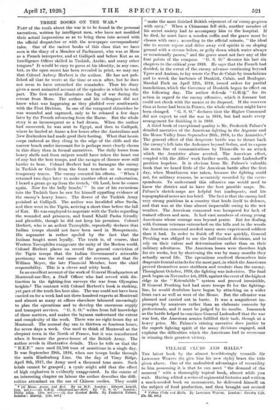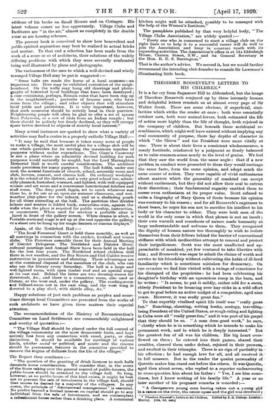VILLAGE CLUBS AND HALLS.*
THE latest book by the almost bewilderingly versatile Sir Lawrence Weaver (to give him his new style) bears the title given above. One of the undoubted advantages of versatility to him possessing it is that he can meet " the demand of the moment" with a thoroughly topical book, almost while you wait. Having edited a series of regimental histories and written a much-needed book on monuments, he delivered himself on the subject of food production, and then brought out revised • Village Clubs and Halls. By Lawrence Weaver. London : Country Life.' 178. OS. net.' edifions of his books on Small Houses and on Cottages; His latest volume comes no less opportunely. Village Clubs and Institutes are " in the air." almost- as completely in the double • sense as are housing schemes.
The present book is conceived to show how benevolent and public-spirited aspirations may best be realized in actual bricks and mortar. To that end a selection has been made from the work of a score or so of architects, their solutions of the widely differing problems with which they were severally confronted being well illustrated by plans and photographs.
The variousness of the uses to which a well-devised and.wisely managed Village Hall.may be put is suggested :— " Some halls are made the home of a loud museum—an important use. Here may be exhibited curiosities of the neigh- bourhood. On the walls may hang old drawing' and photo- graphs of- historical local buildings that have been destroyed ; a case containing, perhaps, Roman coins that have been dug up in the neighbourhood ; portraits of famous men- who have come from the village ; and other objects that will stimulate local pride and patriotism. It is -very -important, however, that such museums should be strictly local in. their purview. Neighbouring people will often be glad to offer a set of spears from Polynesia, or a row of idols from an Indian temple ; but these should be politely but firmly declined, as they-wili occupy space better -devoted to objects of strictly loeal-interest.” Many actual instances are-quoted to show What a variety of activities may find a centre in a properly catholic Village Hall :- " It may be said that because it takes many sorts of people to make a village, the-most useful plan for a village club will be one- which:-provides for its serving, the maximum number of purposes without undue expenditure. The Giant's Causeway is not a place- where an admirably devised building -for such purposes would naturally be sought, but the Lord -Maenaghten Memorial Hall is worth careful consideration. The -architect made pmeision-for -many purposes. The. hall fulfill, -under one roof, the several function-of church, -schooLassembly room-and club, lecture, concert, and cinema hall. On ordinary weekdays it is the school-of the district, and a very good school too, admir- abbrplanned;-furnished,-warrned, and-lighted, with, well-equipped Beim:* and -art room and a convenient Metructional-kitchenland staff room. The deep porch loggia, set to catch whatever sun- there be, is for use as an open-air summer classroom, and wet- weather play-place--for- the- infants; and As--a sheltering porch forall those attending- at the-hall.- The partition :thatzlividea Infants and- seniors is folded back„ concertina-wise, against the walls when the place is required for public worship, instruction, or amusement. When used for services 'a portable altar is laced in front of- the gallery screen. Wifen:drania afoot, a Portable sectional stage is set up at the end opposite the gallery, or a sheet can behung up for magic-lantern or cinema displays."
Again, of the Nettlebed Hall :—
" The local: Foresters' Court is held., there monthly, as well &s- ell meetings in connection with the cricket, football and tennis clubs. The Foresters Assemble- -there -for their Annual Meeting of District Delegates:- The Nettlebed and- District - Horti- cultural meetings -and, Annual. Show have been-held in the hall for. the last four years: The Nettlebed school children drill there in wet weather, and the Boy Scouts and Girl Guides receive instruction-in gymnastics and- shooting. These -advantages- are at -the -continual disposal of the -members of the- club, who can else -use the library. every Saturday. The hall is a large and well-lighted room, with open timber roof and an apsidal stage at its east end. Behind the latter are two dressing-rooms for theatricals, &c., and- there is a committee room, also used as library, at the west: end, under the gallery. The reading-room and billiard-room -are in the east wing, and the west wing is devoted to a play shed, with skittle alley, &c."
Happy solutions of just such problems as perplex and some- times disrupt local Committees are presented from the works of ' such architects as have given these matters their 'especial attention.
The recommendations of the Ministry of Reconstruction's Committee -on Land Settlement, are commendably enlightened- and) worthy of quotation :- " The Village Hall 'should be placed under the full control of the village community on the most democratic basis,-and kept entirely free from any connection with creed, party, or class distinction. It should be available for meetings of various kinds, whether social -or–potiticat; anti- -music -and the cinema should be permanent features in the amenities rovided to remove the stigma of dullness from the life of the villager."
The Report then- continues :- " The question of the granting of drink licences to such halls demands -some cousideration. We consider- that, in the event offish. State taking over the general control of public-houses, the pablio-house should be attached to the village hall. So long, however, as no public-house of this kind exists, it might be hest not to prevent the sale of intoxicants in the village hall, should' that °ours. be desired by a majority of the villagers. In any event, the principle of disinterested management ' is essential. No profits- beyond a limited interest on capital should go to any individual -from- the sale of intoxicants, and we contemplate a refreshment house rather than a drinking place. A communal
kitchen might well be attached, possibly to be managed with the help of the Women's Institute."
The pamphlets published by that very -helpful body, " The Village Clubs Association," are widely quoted :-
"Every one who is concerned to start a village club- on the right lines or to help it to a successful career will do well to join the Association - and - keep - in constant touch with its expanding activities, The Association's office is at 14s Iddeeleigh House, Caxton Street, S.W., and its General Secretary is the Hon. R. E. S. Barrington."
That is the author's advice. We second it, but we would further recommend the intending club-founder to consult Sir Lawrence's illuminating little book.



































 Previous page
Previous page